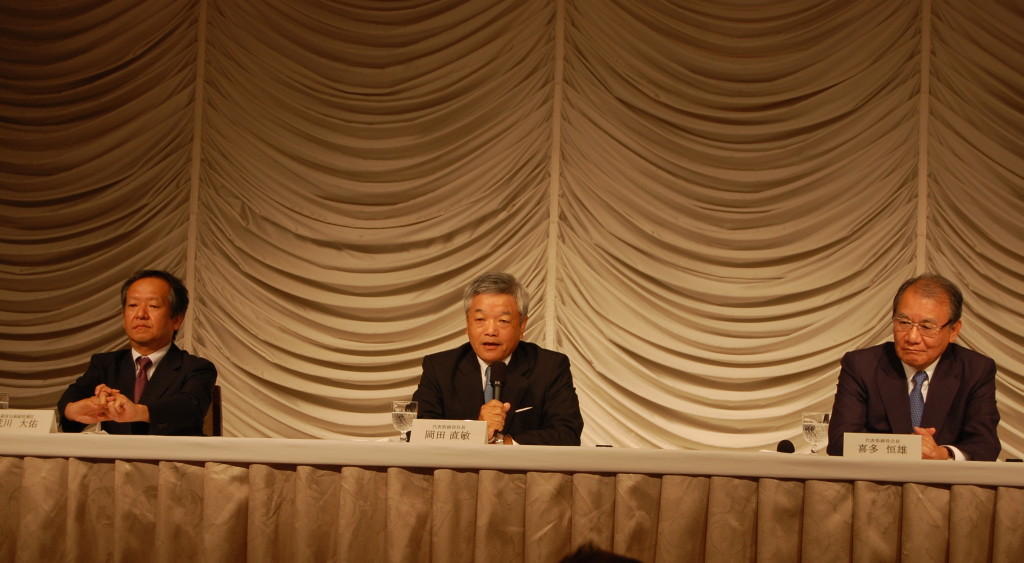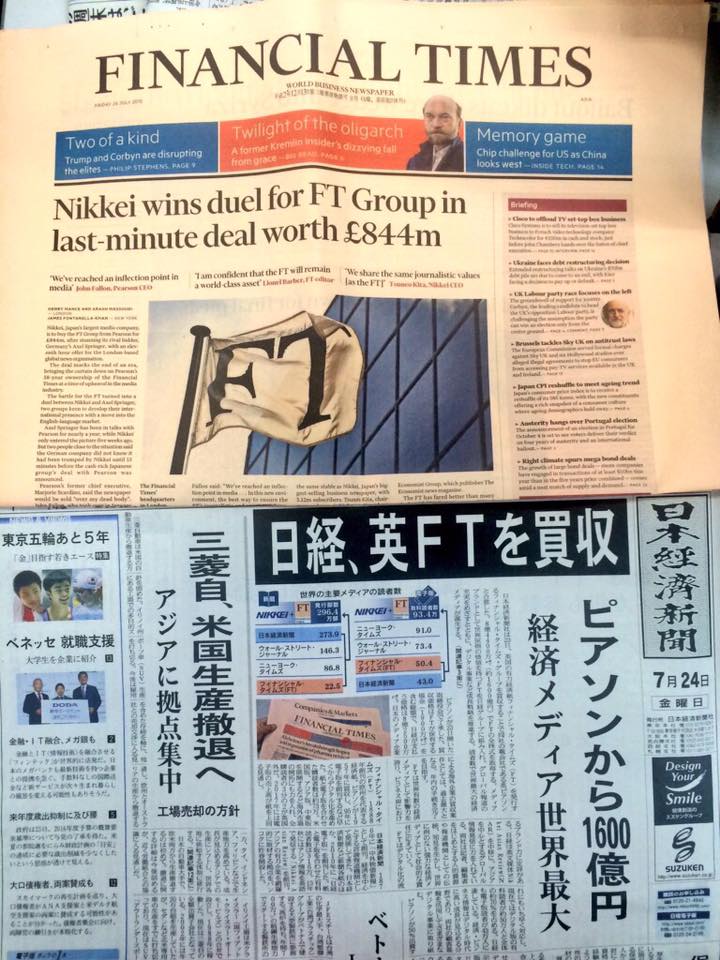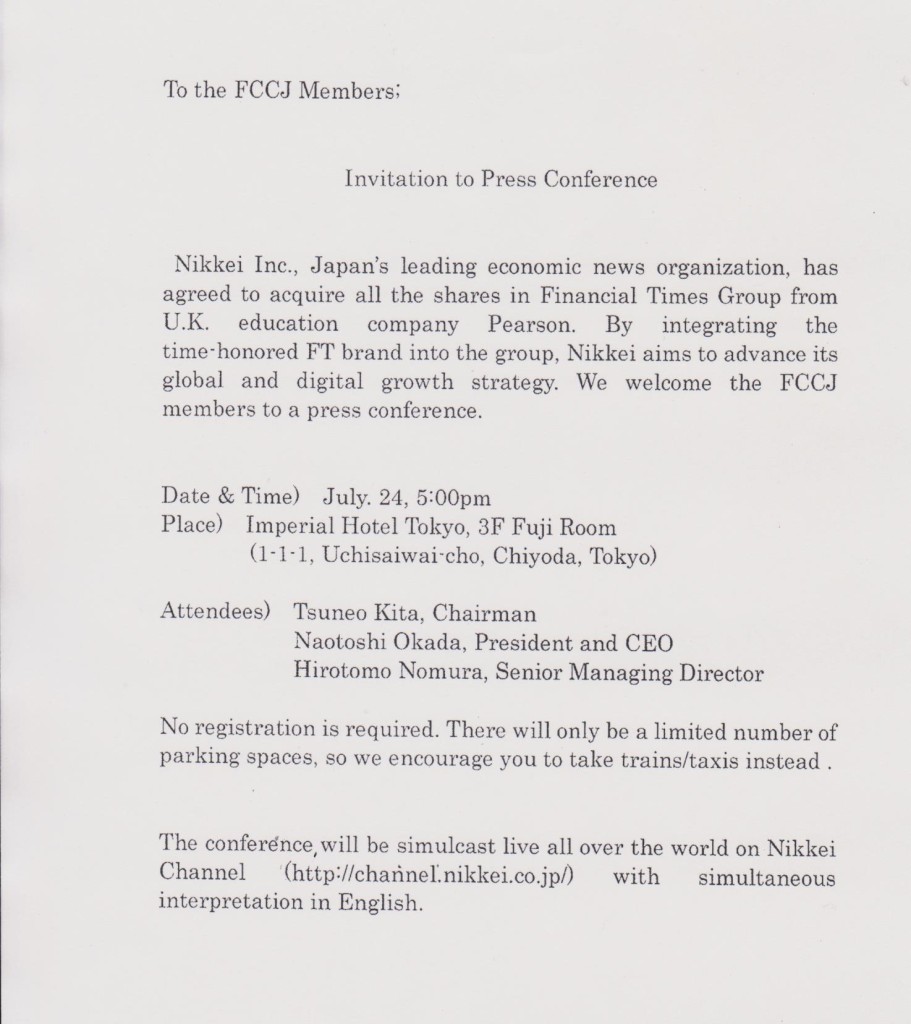On Friday, four executives from the Nikkei media company talked to the press after purchasing Financial Times, the U.K.’s 127-year-old newspaper, for a reported 1.3 billion dollars. The main reasons chairman Tsuneo Kita cited included a desire to expand Nikkei’s reach beyond Japan and to improve its online presence, something FT is much more adept at doing. Investigative journalism is also something the FT is 100 times more adept at doing than Nikkei’s flagship newspaper, which has been likened to a cheerleader or in-house publication of the Japan Business Federation (経団連). Can this merger create synergy or will it be more like MOX fuel?

Many are wondering how hands-on Nikkei will be—or rather how much it will interfere– when it comes to the Financial Times reporting on Japanese businesses and their semi-frequent controversies. Recently, while magazines like ZAITEN were reporting on Toshiba’s “creative accounting” or “improper accounting” as “fraudulent accounting” as early as June, Nikkei continued to use the improper and incorrect term “improper accounting” until the Toshiba friendly third-party committee officially described Toshiba’s over a billion dollars of inflated profits on the books as “false.”
In the 2011 Olympus Scandal, The Financial Times was the first English language paper to break the story, while Nikkei’s Keizai Shimbun (日経新聞) waited about a week to fully report on it and tacitly acknowledge that fraudulent accounting had taken place. Nikkei CEO Naotoshi Okada admitted they could have done a better job reporting on the scandal: “Maybe it is true we were somewhat delayed with reporting on the Olympus scandal,” Okada said. “But this is not because we withdrew ourselves from covering the scandal.”
When asked about whether these contrasting traits would affect the Financial Times’ ability to report stories on time and in their entirety, Okada was first puzzled, not being a fluent speaker of English. I had to ask the question stated that there would be minimal change to how Financial Times operates and emphasized they will be protecting its “editorial independence.”
“Nikkei has no intention to force Financial Times to do editing and reporting as Nikkei wants it done,” Okada said. “Nikkei and FT are totally separate in terms of following respective editorial procedures and policies until the articles are formulated. They’re independently figured out. Nikkei acquiring FT will not result in articles assigned by Nikkei to FT. That is what I mean by ensuring independent right of editing.”
Not trying to make too many promises, Okada then added that acquiring FT still means collaborations will still occur to a certain extent.
“With the acquisition here’s going to be exchange of human resources and of course within editorial companies there’s going to be more frequent exchange of views, but we will still respect that FT is independent.”
In response to the purchase, Michael Woodford—a former CEO at Olympus who was fired for exposing the 1.7 billion dollars major accounting scandal— said that “the media in Japan is self-serving and deferential to powerful forces, and the Nikkei is not regarded as being independent of corporate Japan.”
Woodford was fired for raising questions about payments for financial advice and payments to front companies. He later wrote a book called Exposure:Inside the Olympus Scandal How I Went From CEO to Whistleblower detailing what had happened at Olympus and also expressing thanks to the Olympus employee who had the courage to blow the whistle and to FACTA (a Japanese publication) and the Financial Times for writing the truth.
“Because of this reality, (of Nikkei subservience to corporate interests rather than the interests of the general public), if the FT had been owned by Nikkei at the time of the Olympus scandal I would have unquestionably gone to the New York Times or the Wall Street Journal instead,” Woodford said in a personal statement.
“While I’m sure the FT will be committed to maintaining its editorial independence, I’m deeply troubled that the ‘subliminal effect’ of being owned by Nikkei will make it less willing to publish articles critical of corporate Japan, which very much includes the Nikkei itself which has long tentacles and powerful influence in the country.
This is a sad moment for journalism, not only for this country but also globally.”

Q & A Memo
*The press conference was held yesterday, almost covertly at 5pm at the Imperial Hotel. The Foreign Correspondent’s Club of Japan was notified roughly around 4pm, giving many foreign reporters outside the press club system little time to prepare.

Jake Adelstein, the editor-in-chief of Japan Subculture Research Center notified me. He had covered the Olympus fraudulent accounting extensively and also wrote the afterword to Michael Woodford’s book. He dispatched me to the press conference, as soon as he heard, here’s the question I asked:
“The Financial Times broke the story on the massive Olympus Accounting Fraud while your paper ignored it and was a mouthpiece for Olympus for the first week. Why should we believe you’ll protect the FT tradition of investigative journalism in Japan?”
The answer from Nikkei was as follows (translated from the Japanese)
“Maybe it is true we were somewhat delayed with reporting the Olympus scandal. But this is not because we withdrew ourselves from covering the scandal. Nikkei has no intention to force FT to do the editing and reporting as Nikkei wants it done. Nikkei and FT are totally separate in terms of following respective editorial procedures and policies until the articles are formulated. They’re independently figured out. Nikkei acquiring FT will not result in articles assigned by Nikkei that are covered by FT. That is what I mean by ensuring independent right of editing. With the acquisition here’s going to be exchange of human resources and of course within editorial companies there’s going to be more frequent exchange of views, but we will still respect that ft is independent.”
Jake Adelstein contributed to this report.
Typo:
“while you’re paper ignored it” –> “while YOUR paper ignored it”
Thanks
Oops. Will fix.
I think I recall the Olympus story being broken by FACTA, a Japanese publication – which the FT later picked up, albeit ahead of the Nikkei – correct me if I`m wrong….
Please note the fine print. “The first English language publication”. Who really broke the story—Nikkei Business Kinyu (2009) or ZAITEN (June 2011) is disputed but FACTA did the best work.